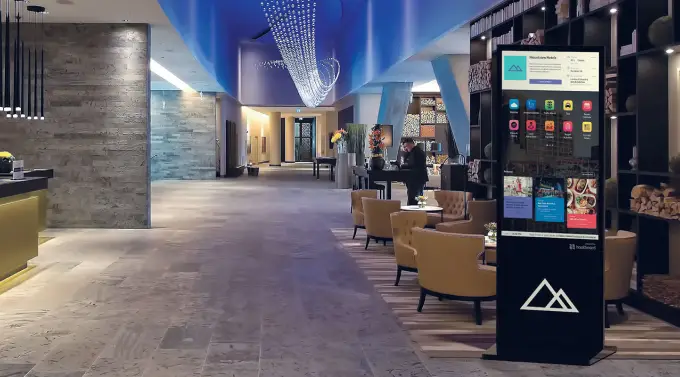The hospitality industry is constantly evolving to meet the changing demands and expectations of travelers. In today's digital age, hotels are leveraging technology to enhance the guest experience and streamline operations. One such technology making waves in the hospitality sector is digital signage. Digital signage refers to the use of electronic displays to convey information, advertisements, and other messages. In this article, we'll explore the growing importance of digital signage in the hospitality industry and its potential impact on the future of hotels.
Enhancing Guest Experience:
Digital signage plays a crucial role in enhancing the overall guest experience. Upon entering a hotel, guests are greeted by dynamic digital displays that provide relevant information such as check-in procedures, hotel amenities, and local attractions. These interactive displays not only provide useful information but also create a modern and welcoming ambiance. Moreover, digital signage can be customized to cater to the preferences of different guest segments, ensuring a personalized experience for each visitor.
Wayfinding and Navigation:
Navigating a large hotel property can be challenging for guests, especially those unfamiliar with the layout. Digital signage addresses this issue by providing interactive maps and wayfinding solutions. Guests can easily locate their rooms, restaurants, conference rooms, and other facilities with the help of digital displays placed strategically throughout the property. This not only improves guest satisfaction but also reduces the workload on hotel staff who would otherwise be inundated with navigation queries.
Revenue Generation:
Digital signage presents lucrative opportunities for hotels to generate additional revenue streams. By partnering with local businesses or third-party advertisers, hotels can display targeted advertisements on their digital screens. For example, a hotel located in a tourist destination can collaborate with nearby attractions or tour operators to promote their services to guests. Additionally, hotels can use digital signage to promote upgrades, add-on services, or loyalty programs, thereby increasing upsell opportunities and boosting revenue.
Promoting Hotel Services and Amenities:
Hotels can effectively promote their services and amenities through digital signage. Dynamic displays can showcase the hotel's restaurants, spa services, fitness facilities, and special promotions in an engaging manner. For instance, a digital display in the lobby can feature mouth-watering images of signature dishes available at the hotel restaurant, enticing guests to dine onsite. Similarly, digital signage can highlight upcoming events, workshops, or entertainment options, encouraging guests to participate and explore all that the hotel has to offer.
Operational Efficiency:
Beyond enhancing the guest experience, digital signage also improves operational efficiency within hotels. Traditional paper-based signage requires frequent updates and maintenance, consuming valuable time and resources. In contrast, digital signage can be remotely controlled and updated in real-time, allowing hotel staff to make instant changes to content as needed. Whether it's updating event schedules, displaying emergency evacuation routes, or promoting last-minute offers, digital signage streamlines communication and reduces administrative overhead.
Data Analytics and Personalization:
One of the most significant advantages of digital signage is its ability to gather valuable data and insights. By analyzing metrics such as viewer demographics, engagement rates, and content effectiveness, hotels can gain a deeper understanding of guest preferences and behavior. This data can then be used to tailor content and offerings to specific guest segments, thereby enhancing personalization and driving customer loyalty. For instance, if digital signage analytics reveal that a particular demographic group shows a strong interest in spa services, the hotel can adjust its marketing strategies accordingly to target that audience more effectively.
Challenges and Considerations:
While digital signage offers numerous benefits, its implementation comes with its own set of challenges and considerations. Hotels must invest in high-quality displays, content management systems, and reliable network infrastructure to ensure seamless operation. Moreover, maintaining consistency in branding and messaging across various digital touchpoints requires careful planning and coordination. Additionally, hotels must prioritize cybersecurity to protect sensitive guest information and prevent unauthorized access to digital signage networks.
Conclusion:
Digital signage software is poised to play a pivotal role in shaping the future of hotels and hospitality. From enhancing the guest experience to improving operational efficiency and revenue generation, the benefits of digital signage are manifold. By leveraging innovative technologies and data-driven insights, hotels can create immersive environments that resonate with guests and drive customer loyalty. As the hospitality industry continues to evolve, embracing digital signage will be essential for hotels seeking to stay ahead of the curve and deliver exceptional guest experiences in the digital age.









